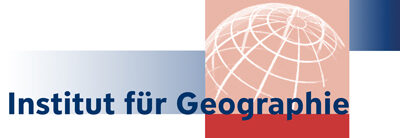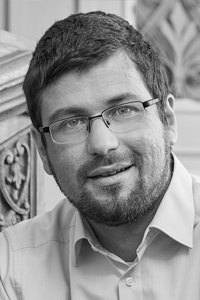Dominik Kremer
Dr. Dominik Kremer
Curriculum Vitae
| seit 04/2022 | Research assistant (postdoc), Department Digital Humanities and Social Studies / Friedrich-Alexander-Universität Erlangen |
| seit 08/2017 | Free-lance IT-consultant in the field Geo-Content-Delivery |
| 04/2020 – 03/2022 | Research assistant (postdoc), Institute for Geography / Friedrich-Alexander-Universität Erlangen |
| 11/2015 – 03/2020 | Employed IT-consultant, DOCUFY GmbH |
| 2016 | Dissertation (Applied Computer Science) Rekonstruktion von Orten als sozialem Phänomen: Geoinformatische Analyse semantisch annotierter Verhaltensdaten. |
| 10/2011 – 09/2015 | Research assistant, Chair for Computing in the Cultural Sciences / Otto-Friedrich-Universität Bamberg |
| 10/2010 – 09/2011 | Scholarship holder, Bayerische Eliteförderung |
| 04/2008 – 09/2010 | Research assistant, Chair for Cultural Geography / Otto-Friedrich-Universität Bamberg |
| 2008 | Diploma (Geography) Der Europabegriff auf außereuropäischen Webseiten. Ein Vergleich des semantischen Kontextes ausgewählter Domains mithilfe rechnergestützter Textanalysemethoden. |
Publications
Recent Papers
- Kremer D., Walker B. (2024):
Placing Wellbeing: Distant Reading Approaches for Exploratory Placial Data Analysis in Geographies of Health and Wellbeing.
In: Dammann F., Kremer D. (2024): Geographical Research in the Digital Humanities. Spatial Concepts, Approaches and Methods (=Digital Humanities Research). transcript.
https://doi.org/10.14361/9783839469187-008 -
Kremer D., Dammann F. (2024):
Spatial Concepts, Approaches and Methods for Digital Humanities – an Introduction.
In: Dammann F., Kremer D. (2024): Geographical Research in the Digital Humanities. Spatial Concepts, Approaches and Methods (=Digital Humanities Research). transcript. -
Dammann F., Kremer D. (2024):
Geographical Research in the Digital Humanities. Spatial Concepts, Approaches and Methods (=Digital Humanities Research). transcript. - Kremer D., Lang S. (2024):
Konzepträume: Ein Vorschlag zur besseren Abstimmung von Theoriehintergrund und digitalen Datenanalysen.
Tagung Digital Humanities im deutschsprachigen Raum, Passau 2024
https://zenodo.org/doi/10.5281/zenodo.10698441 - Kremer D., Wagner A. (2023):
Co-creation of Place-Based Content for Field Trips and Public Trails by Geo-Content Management. Fourth International Symposium on Platial Information Science (=PLATIAL’23). Dortmund, Germany. https://doi.org/10.5281/zenodo.8286273 - Verstegen U., Kremer, D. (2023):
The Nuremberg Stations of the Cross. Enriching On-Site Experiences of a Historical Pathway by the “FAU GeoExplorer” App.
In: Münster S., Pattee A., Kröber C., Niebling F. (eds): Research and Education in Urban History in the Age of Digital Libraries. UHDL 2023 (=Communications in Computer and Information Science 1853). Springer, Cham: 207-219.
https://doi.org/10.1007/978-3-031-38871-2_12 - Kremer D. (2022):
WebGIS meets E-Learning. Werkzeuge für digital unterstützte geographische Exkursionen.
In: Bröll L., Erdmann J., Egbert B. (Hrsg.): Bildung auf Distanz: (Medien-)Technologie, Politik und Lebenswelten in aktuellen Lernprozessen (=e-culture 29). Berlin: 43-54. - Moura de Souza C., Kremer D., Walker B. (2022):
Placial-Discursive Topologies of Violence: Volunteered Geographic Information and the Reproduction of Violent Places in Recife, Brazil.
ISPRS International Journal of Geo-Information 11(10): 1-21.
https://doi.org/10.3390/ijgi11100500 - Kremer D., Felgenhauer T. (2022):
Reasoning COVID-19: the use of spatial metaphor in times of a crisis.
Humanit Soc Sci Commun 265 (9): 1-15.
https://doi.org/10.1057/s41599-022-01264-8 - Stadlmeier A., Kremer D., Walker B. (2022):
Experiences of place-bound sociality amidst the COVID-19 pandemic: A qualitative analysis of environment-related coping strategies.
Erdkunde 76 (3): 171-183.
https://doi.org/10.3112/erdkunde.2022.03.02 - Brinkmann S., Kremer D., Walker B. (2022):
Modelling eye-level visibility of urban green space: Optimising city-wide point-based viewshed computations through prototyping.
AGILE GIScience 27 (3): 1-7.
https://doi.org/10.5194/agile-giss-3-27-2022 - Kremer D., Sonnenwald D., Walker B. (2022):
Explorative räumliche Analyse der Funktion von Landschaft in Videospielen.
Zeitschrift für digitale Geisteswissenschaften Sonderband 5 (2).
https://doi.org/10.17175/sb005_009 - Walker B., Brinkmann S., Große T., Kremer D., Schuurman N., Hystad P., Rangarajan S., Teo K., Yusuf S., Scott L. (2022):
Neighbourhood greenspace and socioeconomic risk are associated with diabetes risk at the sub‐neighbourhood scale: Results from the Prospective Urban and Rural Epidemiology (PURE) Study.
Journal of Urban Health 99: 506-518.
http://doi.org/10.1007/s11524-022-00630-w - Kremer D., Walker B. (2022):
Geodaten quantitativ, aber kritisch analysieren: die Methode der explorativen räumlichen Datenanalyse am Beispiel von COVID‐19 in Brasilien.
In: Dammann F., Michel B. (Hrsg.): Handbuch Kritisches Kartieren. Bielefeld: 307-324.
https://doi.org/10.14361/9783839459584-021 - Kremer D. (2020):
Usage of spatial metaphor in tellings of the crisis.
DiscourseNet Collaborative Working Paper Series. Special Issue Discourse Studies Essays on the Corona Crisis 2 (8): 1-4.
https://discourseanalysis.net/dncwps
Monography
- Kremer D. (2018):
Rekonstruktion von Orten als sozialem Phänomen: Geoinformatische Analyse semantisch annotierter Verhaltensdaten.
Schriften aus der Fakultät Wirtschaftsinformatik und Angewandte Informatik der Otto-Friedrich-Universität Bamberg (30). Bamberg.
10.20378/irbo-51890
Reviewed journal papers/book chapters
- Kremer D., Walker B. (2024):
Placing Wellbeing: Distant Reading Approaches for Exploratory Placial Data Analysis in Geographies of Health and Wellbeing.
In: Dammann F., Kremer D. (2024): Geographical Research in the Digital Humanities. Spatial Concepts, Approaches and Methods (=Digital Humanities Research). transcript.
https://doi.org/10.14361/9783839469187-008 -
Kremer D., Dammann F. (2024):
Spatial Concepts, Approaches and Methods for Digital Humanities – an Introduction.
In: Dammann F., Kremer D. (2024): Geographical Research in the Digital Humanities. Spatial Concepts, Approaches and Methods (=Digital Humanities Research). transcript. - Kremer D., Pfeiffer S., Walker B. (2024):
Effiziente Zusammenarbeit in den Digital Humanities. Ein Erfahrungsbericht aus drei Jahren Anwendung von Scrum in Forschungskontexten.
In: Cremer F., Dögunke S., Wübbbena T. (Hrsg.): Zusammenarbeit klug gestalten: Projektmanagement und Digital Humanities. (=Digital Humanities Research). transcript.
https://doi.org/10.14361/9783839469675-006 - Verstegen U., Kremer, D. (2023):
The Nuremberg Stations of the Cross. Enriching On-Site Experiences of a Historical Pathway by the “FAU GeoExplorer” App.
In: Münster S., Pattee A., Kröber C., Niebling F. (eds): Research and Education in Urban History in the Age of Digital Libraries. UHDL 2023 (=Communications in Computer and Information Science 1853). Springer, Cham: 207-219.
https://doi.org/10.1007/978-3-031-38871-2_12 - Moura de Souza C., Kremer D., Walker B. (2022):
Placial-Discursive Topologies of Violence: Volunteered Geographic Information and the Reproduction of Violent Places in Recife, Brazil.
ISPRS International Journal of Geo-Information 11(10): 1-21.
https://doi.org/10.3390/ijgi11100500 - Kremer D., Felgenhauer T. (2022):
Reasoning COVID-19: the use of spatial metaphor in times of a crisis.
Humanit Soc Sci Commun 265 (9): 1-15.
https://doi.org/10.1057/s41599-022-01264-8 - Stadlmeier A., Kremer D., Walker B. (2022):
Experiences of place-bound sociality amidst the COVID-19 pandemic: A qualitative analysis of environment-related coping strategies.
Erdkunde 76 (3): online first.
https://doi.org/10.3112/erdkunde.2022.03.02 - Kremer D., Sonnenwald D., Walker B. (2022):
Explorative räumliche Analyse der Funktion von Landschaft in Videospielen.
Zeitschrift für digitale Geisteswissenschaften Sonderband 5 (2).
https://doi.org/10.17175/sb005_009 - Walker B., Brinkmann S., Große T., Kremer D., Schuurman N., Hystad P., Rangarajan S., Teo K., Yusuf S., Scott L. (2022):
Neighbourhood greenspace and socioeconomic risk are associated with diabetes risk at the sub‐neighbourhood scale: Results from the Prospective Urban and Rural Epidemiology (PURE) Study.
Journal of Urban Health 99: 506-518.
10.1007/s11524-022-00630-w - Kremer D., Walker B. (2022):
Geodaten quantitativ, aber kritisch analysieren: die Methode der explorativen räumlichen Datenanalyse am Beispiel von COVID‐19 in Brasilien.
In: Dammann F., Michel B. (Hrsg.): Handbuch Kritisches Kartieren. Bielefeld: 307-324.
https://doi.org/10.14361/9783839459584-021 - Schlieder C., Kremer D., Heinz T. (2018):
Teaching Geogame Design: Game Relocation as a Spatial Analysis Task.
In: Ahlqvist O., Schlieder C. (Eds.): Geogames and Geoplay. Advances in Geographic Information Science. Cham: 111-130.
https://doi.org/10.1007/978-3-319-22774-0_6 - Feulner B., Kremer D. (2016):
Geogames – Räume neu erfahren am Beispiel CityPoker.
In: Gryl I. (Hrsg.): Reflexive Kartenarbeit. Diercke Methoden und Aufgaben. Braunschweig: 129-141. - Stein K., Kremer D., Schlieder C. (2015):
Spatial Collaboration Networks of OpenStreetMap.
In: Arsanjani J., Zipf A., Mooney P., Helbich M. (Eds.): OpenStreetMap in GIScience. Experiences, Research, and Applications (Lecture Notes in Geoinformation and Cartography). Cham: 167-186.
https://link.springer.com/chapter/10.1007/978-3-319-14280-7_9 - Kremer D., Schlieder C. (2014):
Less is more: empirical design criteria for a tourist place recommendation service which decelerates the visiting experience.
Journal of Location Based Services 8 (4): 268-284.
https://doi.org/10.1080/17489725.2014.981230 - Schlieder C., Kremer D. (2014):
Geogames als Medium: Schüler entwickeln Inhalte für ein ortsbezogenes Spiel.
Praxis Geographie 2014 (7/8): 31-35. - Kremer D., Stein K. (2014):
Ein Analyseansatz für Nutzerverhalten auf Basis von OSM-Daten.
Kartographische Nachrichten 64 (3): 144-152.
https://link.springer.com/article/10.1007/BF03544144 - Kremer D. (2013):
Orts(re)konstruktionen. Analyse der Mikrostruktur ortsbezogener Argumentationsmuster in Erinnerungsnarrativen Bamberger Einwohner.
Berichte. Geographie und Landeskunde 87 (2): 175-193. - Kremer D. (2012):
Determinismus, Diffusion, Geographie, Geographie-Machen, Handeln, Nachhaltigkeit, Ontologie, Raumfalle, Reichweite, Umwelt, Zeitgeographie.
In: Günzel S. (Hrsg.): Lexikon Raumphilosophie. Darmstadt.
Reviewed short papers at conferences
- Kremer D., Lang S. (2024):
Konzepträume: Ein Vorschlag zur besseren Abstimmung von Theoriehintergrund und digitalen Datenanalysen.
Tagung Digital Humanities im deutschsprachigen Raum, Passau 2024
https://zenodo.org/doi/10.5281/zenodo.10698441 - Kremer D., Wagner A. (2023):
Co-creation of Place-Based Content for Field Trips and Public Trails by Geo-Content Management. Fourth International Symposium on Platial Information Science (=PLATIAL’23). Dortmund, Germany. https://doi.org/10.5281/zenodo.8286273 - Brinkmann S., Kremer D., Walker B. (2022):
Modelling eye-level visibility of urban green space: Optimising city-wide point-based viewshed computations through prototyping.
AGILE GIScience 27 (3): 1-7.
https://doi.org/10.5194/agile-giss-3-27-2022 - Kremer D. (2020):
Usage of spatial metaphor in tellings of the crisis.
DiscourseNet Collaborative Working Paper Series. Special Issue Discourse Studies Essays on the Corona Crisis 2 (8): 1-4.
https://discourseanalysis.net/dncwps - Feulner B., Kremer, D. (2014):
Using Geogames to foster spatial thinking.
In: Vogler R., Car A., Strobl J., Griesebner G. (Eds.): GI_Forum 2014. Geospatial Innovation for Society. Vol. 2: 344-347. - Kiefer P., Giannopoulos I., Kremer D., Schlieder C., Raubal M. (2014):
Starting to get bored: An outdoor eye tracking study of tourists exploring a city panorama.
In: ETRA 2014: Symposium on Eye-Tracking Research and Applications: 315-318.
https://doi.org/10.1145/2578153.2578216 - Kremer D., Schlieder C., Feulner B., Ohl U. (2013):
Spatial Choices in an Educational Geogame.
In: Gatzidis C., Zhang J., Anderson E., Tian F. (Eds.): 2013 5th International Conference on Games and Virtual Worlds for Serious Applications (VS-GAMES): 1-4.
https://doi.org/10.1109/vs-games.2013.6624243 - Schlieder C., Kremer D. (2011):
Visiting the Same Place but Seeing Different Things: Place Models of Touristic Behavior.
In: Henrich A., Schlieder C., Schmid U. (Eds.): Visibility in Information Spaces and in Geographic Environments. Post-Proceedings of the KI’11 Workshop (October 4th, 2011, TU Berlin, Germany). Bamberger Beiträge zur Wirtschaftsinformatik und Angewandten Informatik (89): 15-21.
Other papers
- Kremer D. (2022):
WebGIS meets E-Learning. Werkzeuge für digital unterstützte geographische Exkursionen.
In: Bröll L., Erdmann J., Egbert B. (Hrsg.): Bildung auf Distanz: (Medien-)Technologie, Politik und Lebenswelten in aktuellen Lernprozessen (=e-culture 29). Berlin: 43-54. - Kremer D. (2014):
Touristisch genutztes Welterbe erleben: Die Perspektive der Einwohner – Eine empirische Studie am Beispiel Bambergs.
Frankenland 66 (3): 189-197. - Kremer D., Lehmeier H., Stein K. (2011):
Welterbestätten zwischen normativen Raumbildern und touristischer Wahrnehmung – eine Analyse am Beispiel des UNESCO-Welterbes Bamberg.
In: Steinecke A., Kagermeier A. (Hrsg.): Kultur als touristischer Standortfaktor: Potenziale Nutzung Management. Paderborner Geographische Studien zu Tourismusforschung und Destinationsmanagement (23). Paderborn: 57-70.
Organized workshops
- 22.09.2023 DKG’23: Deutscher Kongress für Geographie, Frankfurt am Main
Vernetzungstreffen mit dem Ziel der Verstetigung einer „AG Fachkonzept digitale Exkursionen“
(co-organised with Barbara Feulner and Uwe Schulze) - 13. & 14.07.2023: Workshop Das soziale Imaginäre lesbar machen.
(co-organised with Larissa Pfaller and Ingo Rohrer)
Own contribution: Mechanisms of hiding and highlighting in the digital sphere: Reconstructing the spread of imaginaries of authoritarian power in the Arab Twittersphere
(with Laura Schuhn) - 20.01.2023 Workshop Digital unterstützte Geographiedidaktik.
(co-organised with Georg Glasze and Ute Verstegen)
Own contribution: FAU Geo-Explorer: Workflows + Roadmap
(with Andreas Wagner and Lukas Panzer) - 27.09. – 1.10.2021 Humangeographische Sommerschule: Digitale Geographien
(co-organised with Finn Dammann, Georg Glasze, and Blake Walker)
Own contribution: Modul 2: GIS und die digitale Modellierung von Raum
(with Blake Walker) - 12. & 13.03.2021 Workshop Geography meets Digital Humanity: Neuere Ansätze raumbezogener Modellierung
(co-organised with Finn Dammann)
Own contribution: Semantische Kontextanalyse von COVID-19-Diskursen mittels Association Rule Mining
Recent Talks
-
29.2.2024 DHd Jahrestagung, PassauKonzepträume: Ein Vorschlag zur besseren Abstimmung von Theoriehintergrund und digitalen Datenanalysen(with Sabine Lang)
-
26.2.2024 DHd Jahrestagung, PassauDigital-Humanities-Theorie in DH-Studiengängen(Teilnahme am Diskussions-Panel)
- 24.11.2023 Digitale Disruptionen, Mainz
Muting debates – Kommunikationsstruktur von Twitter-Diskursen im arabischen Raum
(with Laura Schuhn) - 28.09.2023 Workshop. Geolingual Studies (GLS). A New Research Direction, Würzburg
Regionalising the pandemic – The use of spatial metaphors and toponyms setting the scene in the early days of COVID-19
(with Tilo Felgenhauer and Andreas Wagner) - 27.09.2023 10. Bayerischer Kongress für den Öffentlichen Gesundheitsdienst
Öffentliche Gesundheit im Wandel – Innovationen und Herausforderungen, Würzburg
Herausforderungen der Transformation zur Klimaresilienz: Ein Werkstattbericht zu einem Mediationsprozess und erste Befunde aus Expert*inneninterviews in der Region Oberfranken-West
(with Blake Walker, Anna Stadlmeier, Christian Sommer, Sibille Wehrmann, Thomas Mölg and Matthias Braun) - 22.09.2023 DKG’23: Deutscher Kongress für Geographie, Frankfurt am Main
Nutzung vielfältiger Open Educational Resources in einer zentralen Erfassungs- und Präsentationsplattform für digital unterstützte Exkursionen? - 22.09.2023 DKG’23: Deutscher Kongress für Geographie, Frankfurt am Main
Der GeoExplorer: Eine zentrale Erfassungs- und Präsentationsplattform für digital unterstützte Exkursionen
(with Barbara Feulner) - 21.09.2023 DKG’23: Deutscher Kongress für Geographie, Frankfurt am Main
Transformation zur Klimaresilienz: Ein Werkstattbericht aus einem Mediationsprozess zur Aktivierung und Etablierung lokaler Initiativen in Oberfranken
(with Anna Stadlmeier and Blake Walker) - 21.09.2023 DKG’23: Deutscher Kongress für Geographie, Frankfurt am Main
Urban jungles: Human health and the shared imaginaries of urban greenspace
(with Blake Walker) - 21.09.2023 PLATIAL’23: International Symposium on Platial Information Science, Dortmund
Co-creation of Place-Based Content for Field Trips and Public Trails by Geo-Content Management
(with Andreas Wagner) - 13.07.2023 Workshop Das soziale Imaginäre lesbar machen, Erlangen
Mechanisms of hiding and highlighting in the digital sphere: Reconstructing the spread of imaginaries of authoritarian power in the Arab Twittersphere
(with Laura Schuhn) - 07.07.2023 International Symposium on Isotope Hydrology, IAEA, Wien
Project Launch: The Groundwater Isotope Map of Germany
(with Robert van Geldern, Johannes Barth, Blake Walker, Paul Königer, Axel Schmidt, Heinrich Eisenmann,
Michael Heidinger, Philip Schuler, and Aixala Gaillard) - 05.07.2023: GI_Salzburg 2023, Salzburg
Tracing individual experiences of everyday greenness: Initial results from the SpaceLog mobile app.
(with Adreas Neuner, Sarah Jelinski, Anna Stadlmeier, Christoph Schlieder, and Blake Walker) - 21.06.2023 Digital Geographic Movements and Methods, Calgary
Dispatches, Discourses and Debates in the German-language Digital Geographies Community
(with Blake Walker, Finn Dammann, Tabea Bork-Hüffer, and Georg Glasze)
Phylogeny and Resituating the Subject in GIS and Environmental Health
(with Blake Walker) - 20.06.2023: Media and Learning 23, Leuven
Enriching on-site experiences by the “FAU GeoExplorer” App - 27.03.2023: UHDL 2023, München
The Nuremberg Stations of the Cross. Enriching on-site experiences of a historical pathway by the “FAU GeoExplorer” App
(with Ute Verstegen) - 15.03.2023 FOSSGIS 2023, Berlin
Freie Fahrt für die Mobilitätswende? Ergebnisse explorativer Analysen freier Geodaten
(with Susanne Schröder-Bergen) - 20.01.2023 Workshop Digitale unterstützte Exkursionsdidaktik, Erlangen
FAU Geo-Explorer: Workflows + Roadmap
(with Andreas Wagner and Lukas Panzer) - 18.11.2022: Digitale Geographien, Halle
Kritisch denken – digital forschen. Eine positive Zukunft für die Digital Geohumanities? - 20.07.2022 VKG Vernetzungstreffen, München
Resilienz durch Kulturlandschaft im Klimawandel
(with Blake Walker, Thomas Mölg, and Matthias Braun) - 07.07.2022 GI Salzburg 2022, Salzburg
Phylogeny and Resituating the Subject in GIS and Environmental Health
(with Blake Walker) - 05.07.2022 GI Salzburg 2022, Salzburg
FAU Geo-Explorer – A platform for staging E-learning outdoors
(with Adreas Wagner) - 15.06.2022 AGILE 2022, Vilnius
Modelling eye-level visibility of urban green space: Optimising city-wide point-based viewshed computations through prototyping.
(with Sebastian Brinkmann and Blake Walker) - 20.04.2022 UrbanMetaMapping Semester Talks, Online
“Go home, bus! You come from where Corona is!“ The use of spatial metaphors as a tool for reducing complexity in times of a crisis. - 12.03.2022 Game Science. Digital Humanities for Games and Gaming, Online
Exploring individual sense-making of virtual landscapes in video games
(with Blake Walker) - 8.10.2021 Digital Geographies Networking Forum (Geowoche 2021), Online
Digital Geographies in Virtual Space: Exploring virtual landscapes in video games
(with Daniel Sonnenwald, Martin Fuchs, and Blake Walker - 8.10.2021 COVID-19 – Geographien der Zäsur (Geowoche 2021), Online
Ortsgebundene soziale Lebenswelt und Resilienz: Bewältigungsstrategien in der COVID-19-Pandemie
(with Anna Stadlmeier and Blake Walker) - 14.09.2021 CultMedia Jahrestagung 2021, Online
WebGIS meets E-Learning. Tools for digitally augmented geographical excursions - 11.07.2020 #DNACVD19 eWorkshop 1, Online
Usage of spatial metaphor in tellings of the crisis - 08.11.2018 Tagung Digitale Methoden und Objekte in Forschung und Vermittlung der mediävistischen Disziplinen, Bamberg
Lessons Learned – Erfahrungsbericht aus der Schnittstellenarbeit zwischen Geisteswissenschaften und Informatik - 26.10.2018 Workshop Althochdeutsch Online, Bamberg
Die Bamberger LegIT-Datenbank: Korpus, Konzeption und die Herausforderung der langfristigen Nachnutzbarkeit
(zusammen mit Anette Kremer)
Research
 |
Environmental effects of crisis discourses
Environmental crises as challenges for society as a whole (such as the COVID-19 pandemic), but also insidious crises (such as climate change) form a special field of discourse. In the effort to arrive at assessments or to justify them under high uncertainty or high pressure to act, patterns of argumentation are used in political but also in everyday language and make complexity manageable but also are prone to fallacy (cf. image schemata; Lakoff/Johnson 1980). To reveal the inner mechanisms of these discourses and their change over time with a special focus on body- and space-related metaphors is the subject of this research focus. Running projects REKKE (Resilienz durch Kulturlandschaft im Klimawandel) – german only Related work
|
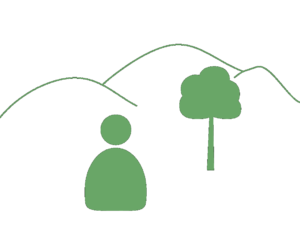 |
Theory-grounded geo-modelling
Maps are unsuitable as a representation of individual experiences of place (Cresswell 2004). Models of semantic, visual, and mobility experiences in local (everyday or tourist) spaces are thus a research gap that can bear a number of further applications. Text analysis enables the comparison of the semantic context in which places are negotiated. Analyses of visual material provide information about foci of attention, and mobility analyses provide insight into everyday worlds of experience. To close this modeling gap, to increase the geoinforrmatic expression possibilities and at the same time to bring it closer to the claim of informed theory-based social research, is the subject of this research focus. Related work
|
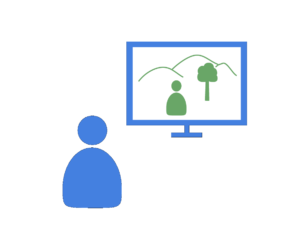 |
Experiences of digital environments
Geographic perspectives and analyses of film and media are long established (Cresswell and Dixon 2002) and consider film as an approach to interrogating everyday perceptions of space. Traditional dichotomies such as ‘civilization’ versus ‘wilderness’ form topoi that lend themselves to viewers in search of the escapist fantasy (Kirsch 2002). This perspective can also be applied to video games with the concept of environmental storytelling (Ascher 2014) (e.g. Günzel 2019) and helps to understand which structures guide individual experiences of digital environments. Mobile location-based games introduce an interaction element with location movement that video games lack. They are interesting for a closer geodidactic examination because they not only support the social interaction of players, but also the individual appropriation of a space, e.g. of an urban neighborhood or a nature park. Related work
|
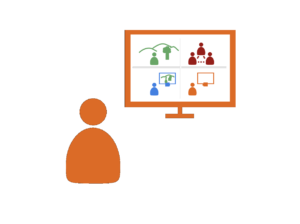 |
Geo-Publishing
Common WebGIS systems are currently just beginning to integrate functions of classic content management systems such as structured release processes, versioning, multi-language support, and search and filter options. In this way, apps can be developed for the first time that consider the continuous content acquisition process to lie inside the app, integrate location-based multimedia into the app, and enable on-site participation. The further development of these approaches in application-related projects with application partners is the subject of this research focus. Running projects IsoGW (Grundwasser-Isoscapes für Deutschland) – german only Related work
|
